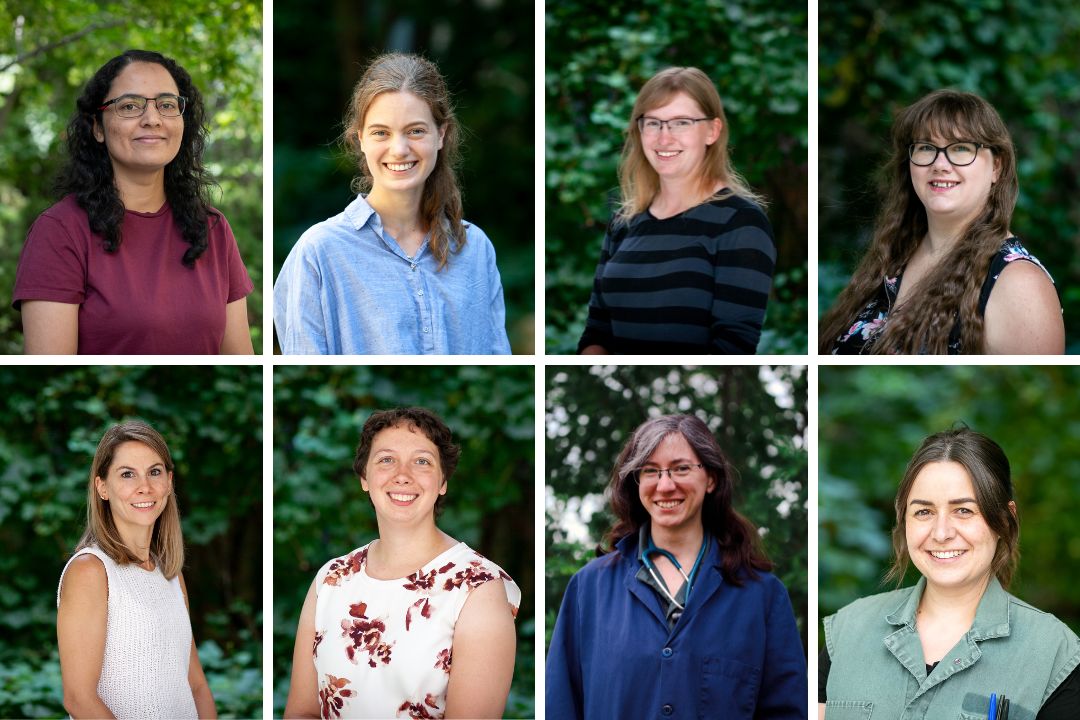
WCVM-connected graduate students participate in USask fall convocation
Twelve graduate students connected to the Western College of Veterinary Medicine (WCVM) celebrated a major milestone this fall, joining a group of 944 University of Saskatchewan (USask) students at convocation ceremonies held in mid-November.
By Rigel SmithSix students completed their Master of Science (MSc) degrees, one earned a Master of Veterinary Science (MVetSc) degree, and five earned their Doctor of Philosophy (PhD) degrees. The list of graduates also includes one graduate student based at the USask Toxicology Centre whose research was co-supervised by a WCVM professor emeritus.
Six veterinarians also received graduate certificates following a one-year small animal rotating internship at the WCVM Veterinary Medical Centre (VMC). Five other veterinarians earned graduate certificates after completing a one-year small animal specialty internship at the hospital.
The convocation ceremony for all USask programs took place on Wed., Nov. 13. Click here to view the USask Fall Convocation booklet.
DEPARTMENT OF LARGE ANIMAL CLINICAL SCIENCES
Katrina Rose Garneau, MSc program
Supervisor: Dr. Diego Moya
Thesis title: “Characterization and optimization of visual pen checking criteria to improve bovine respiratory disease treatment outcomes in newly arrived feedlot cattle.”
Snapshot: Bovine respiratory disease (BRD) is a major health issue in feedlot cattle and this study aimed to identify its clinical signs in calves. Researchers observed cattle at feedlots in Alberta and Saskatchewan, measuring key indicators such as rectal temperature, blood lactate, lung sounds and associated clinical signs. Additionally, a survey of pen riders across Western Canada revealed that most employees rely on signs like laboured breathing and posture changes to detect BRD. Pen riders were then tested for their ability to successfully diagnose BRD via video clips of affected and control calves. The study suggests that pen riding could play a valuable role in preventing BRD, but more research is needed to further understand and improve this practical approach.
Paula Viviani, MSc program
Supervisor: Dr. Julia Montgomery
Research focus: "Determining seasonality of baseline plasma ACTH and serum insulin in healthy horses in Saskatchewan."
Brian Warr, MSc program
Supervisor: Dr. Murray Jelinski
Research focus: "Septic arthritis in western Canadian feedlot cattle: a comparison of antimicrobial treatment options and a description of the bacterial communities present in infected joints."
DEPARTMENT OF VETERINARY MICROBIOLOGY
Leonie Bettin, PhD program
Supervisor: Dr. Volker Gerdts
Thesis title: “Evaluating the innate immune functions of porcine gamma-delta T cells.”
Snapshot: Gamma-delta (γδ) T cells, a unique type of immune cell, play an important role in defending the body from infections. Unlike typical innate immune cells, which provide broad, non-specific responses, gamma-delta T cells can recognize specific stress signals and certain pathogens directly without needing other cells to first provide additional information. Although they’re rare in human blood, gamma-delta T cells are abundant in pigs. This study explored how gamma-delta T cells in pigs function similarly to innate immune cells. Researchers found that these cells respond to stress signals and can directly recognize certain viruses. As pigs age, gamma-delta T cells show different characteristics and become more effective by using pathways that improve their ability to respond to viruses. The findings highlight gamma-delta T cells’ potential role in early immune defence, providing insights into how these cells might help combat infections in livestock and potentially in other species.
DEPARTMENT OF SMALL ANIMAL CLINICAL SCIENCES
Alexandra Frey Belotta, MSc program
Supervisor: Dr. Sally Sukut
Research focus: Medical imaging
Bruna Hech, MSc program
Supervisor: Dr. Barbara Ambros
Research focus: Treatments for opioid-induced vomiting in dogs
Ariel Schlag, MSc program
Supervisor: Dr. Cindy Shmon
Research focus: Small animal surgery
DEPARTMENT OF VETERINARY BIOMEDICAL SCIENCES
Breanne Murray, PhD program
Supervisor: Dr. Karen Machin
Thesis title (embargoed): “A multimodal approach to examining the effects of maternal and post-hatch stressors on physiological processes in mallard ducks.”
DEPARTMENT OF VETERINARY PATHOLOGY
Hemlata Gautam, PhD program
Supervisor: Dr. Susantha Gomis
Thesis title (embargoed): “Developing strategies to control necrotic enteritis in broiler chickens.”
Madison Ricard, PhD program
Supervisor: Dr. Dr. Bruce Wobeser
Thesis title: “Investigations into causes of equine abortions and perinatal loss in Canada.”
Snapshot: Equine abortion and early foal death are significant challenges for Canada’s horse breeders, with bacterial infections (notably septicemia) as a primary cause. This study uncovered a possible role of Chlamydia abortus in equine abortions in Western Canada, identifying 22 positive cases in tissue samples. It also found that foals with longer or more twisted umbilical cords face a higher risk of health complications, such as delayed development and medical needs. These insights help shed light on critical factors behind equine abortion and foal loss in Canada.
Amber Allain, MVetSc program
Supervisor: Dr. Nicole Fernandez
Program focus: Clinical pathology
TOXICOLOGY (co-supervised by WCVM faculty)
Phillip John Ankley, PhD program
Supervisors: Drs. Markus Brinkmann (School of Environment and Sustainability) and John Giesy (Department of Veterinary Biomedical Sciences)
Thesis title (embargoed): “Application of omics for the assessment of response of early-life stage salmonids to emerging chemical stressors.”
Graduate certificate in small animal rotating veterinary internship (one year)
Ane Caroline Dall’Agnol
Hannah Emami Alagha
Cristina Prade Ramos
Abedin Shaban Zadeh
Yong Bin Teoh
Flavia Thaysa Vieira Freitag
Graduate certificate in small animal specialty veterinary internship (one year)
Sonja Ing
Angèle Aimée Lalonde
Jessica Pui Man Lam
Krittin Thitiprasert
Celia Vilar Esteban
